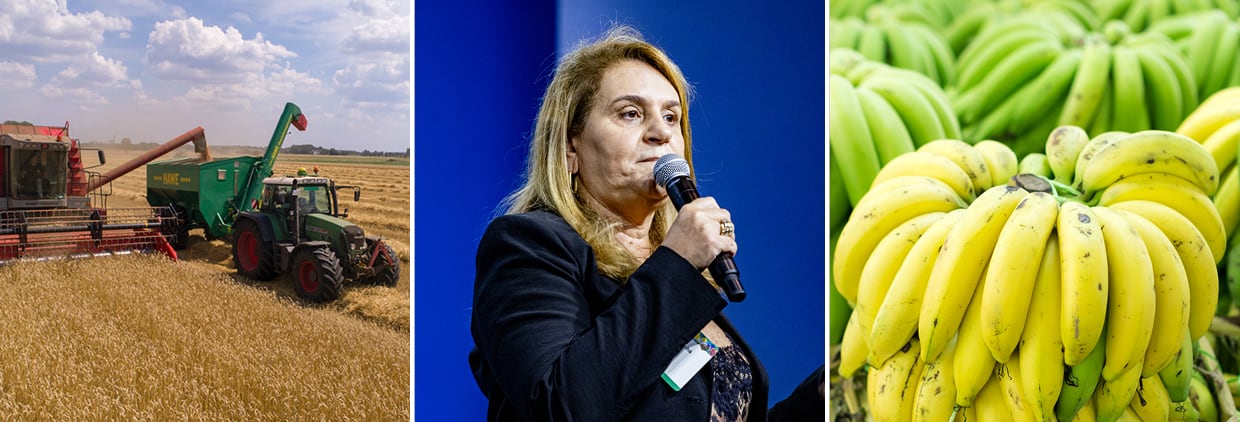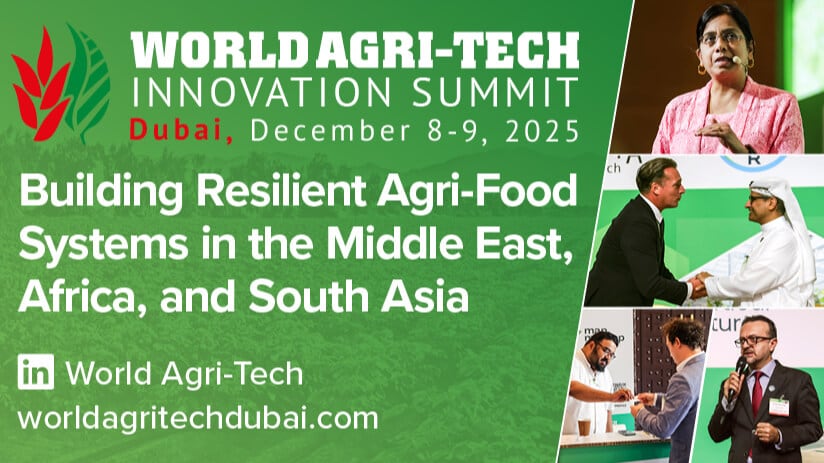In November 2025, Brazil will host the UN Climate Change Conference (COP 30), turning the world’s attention to South America and its role in addressing the climate crisis.
In 2024, Brazil was Latin America’s largest agricultural producer, followed by Argentina and Mexico.¹ The three countries are among the top ten producers of agricultural products in the world. However, extreme weather conditions such as higher temperatures, floods and droughts are threatening food security and livelihoods.
According to the World Meteorological Organisation, Latin America is responsible for 14% of the world’s food production and will be one of the region’s ‘most challenged’ by climate change.² One major challenge arises from widespread droughts which impact shipping routes, crop yields and food production, worsening food security.
Extreme weather events are already causing loss and damage to vital infrastructure, water and energy-related shortages, displacement, and population safety. As these challenges continue to worsen, moving towards more resilient, sustainable farming is essential.
While agricultural practices are responsible for a significant portion of greenhouse gas (GHG) emissions, more sustainable farming systems have the potential to improve climate-related issues.
Regenerative agriculture – a conservation and rehabilitation approach to food and farming – can be leveraged to sequester carbon by capturing and storing atmospheric carbon dioxide, regenerating soils by feeding and preserving its biological structures, and enhancing biodiversity to diversify the habitats and vegetation structures available. These solutions can help restore productive, healthy and resilient ecosystems.
Key developments in sustainable agriculture in South America include biological solutions, initiatives to drive emissions reductions, and opportunities around financial strategies to help farmers evolve and innovate in a sustainable way.
As the world is drawn into the climate crisis, agriculture is at the forefront of discussions on sustainability. But what are the challenges – and what solutions are being introduced to improve farming processes and alleviate some of the pressing climate issues?
Biologicals for sustainable farming
A promising development in sustainable agriculture is the use of biological products. Biologicals are natural, innovative agricultural technologies which are designed for crop production and protection purposes.
Made from natural compounds or living organisms, biologicals aim to enhance biodiversity, improve soil health, and reduce reliance on synthetic inputs like fertilizers and pesticides, promoting healthier crops and reducing environmental damage.
Brazil is one of the most advanced markets for biologicals, with 55% of its cultivated land incorporating some form of biological product in an effort to preserve its natural environment.³
However, despite their benefits, biologicals can face challenges and resistance to widespread adoption. Many countries lack policies governing the approval and commercialization of biological products, slowing market entry. For example, where some countries establish specific guidelines, others lack regulations or have only recently begun developing them.⁴
Research and investment in biologicals is helping to overcome challenges of widespread adoption. The Brazilian Agricultural Research Corporation (Embrapa), one of the largest agricultural research corporations in the world, is leading innovation in the sector. In 2023, technologies developed by Embrapa and its partners generated an impact of $85.12 billion thanks to solutions including biological nitrogen fixation, no-till farming systems, and bioinputs, among others.⁵
Other South American countries, including Argentina, are also supporting biological programmes.⁶ In collaboration with the National Bioeconomy Directorate of Argentina, AL-INVEST Verde is working to strengthen the production of natural fertilizers and nutrients for agricultural use.⁷
Reducing agricultural emissions
Agricultural emissions are a significant concern in Latin America. The region accounts for 7% of global GHG emissions of which 40% result from agriculture, forestry and other land use.⁸
While precision farming and regenerative agriculture practices can reduce emissions, accurately measuring reductions remains a challenge, particularly in tropical climates.
“Quantifying emissions in tropical agriculture requires a differentiated approach due to the unique characteristics of these systems, including highly biodiverse soils, intense rainfall regimes and a wide variability in production systems,” says Guilherme Soria Bastos Filho, Coordinator at Fundação Getulio Vargas.
“Unlike Europe and North America, where agricultural models are mostly based on intensive high-input systems and confinement, tropical agriculture – especially in Brazil – stands out for its use of practices such as biological nitrogen fixation, crop-livestock-forest integration, and conservation soil management, which significantly impact emissions balances.
“However, many international methodologies still use generic emission factors (IPCC Tier 1), overestimating emissions from tropical agriculture by disregarding regional carbon sequestration practices and reducing synthetic inputs.
“Investing in research that tropicalises emissions metrics is essential to ensure that climate policies and market mechanisms accurately reflect the reality of agricultural production in tropical countries,” adds Bastos Filho.
These frameworks can also be hard to implement in developing countries due to budgetary limitations, lack of data collection tools, expertize, previous studies, monitoring instruments, and databases.⁹
In December 2024, Brazil introduced a regulated carbon market, requiring industries to adopt low-carbon technologies. However agriculture was excluded from this, and there is growing pressure for the sector to be included in these targets, with initiatives spearheaded by organizations including the University of Sao Paulo and Greenhouse Gas Reduction in Agricultural Production Alliance (GRAPA).¹⁰
Financing sustainable farming
Financing innovations into sustainable agriculture across South America is a continuing challenge. Adopting more sustainable practices can require significant investment, but for many farmers in South America margins are thin and surplus funds limited. Interest rates for borrowing are high and volatile commodity prices can make long-term investment risky.
“South American agribusiness is currently caught in a negative impact loop, where outdated financial models fail to differentiate between high-risk, unsustainable farms and those that are efficient and environmentally responsible,” says Kieran Gartlan, Managing Director at The Yield Lab.
“This one-size-fits-all approach to farm credit means that highly sustainable, low-risk farmers are forced to pay the same high interest rates as their less efficient counterparts.
“The key to breaking this cycle lies in leveraging smart technology – such as satellite imagery and ground data – to accurately assess crop risk and sustainability. By integrating precision risk management, we can ensure that farmers with sustainable practices receive better credit conditions. This, in turn, enables them to invest in superior inputs and adopt more environmentally friendly practices.
“Over time, this approach creates a positive impact loop: as more farmers embrace technology to improve sustainability and risk assessment, they gain access to better financing.
“Meanwhile, high-risk, inefficient farmers will face increasing pressure to adapt or exit the market. This shift not only strengthens the financial health of agribusiness but also drives meaningful progress toward climate resilience in the sector,” adds Gartlan.
In a bid to support farmers in their transition to climate-smart agriculture, new financial mechanisms are emerging, backed by institutions such as World Bank and the Inter-American Development Bank (IDB). Since 2019, the IDB has provided approximately $1.38 billion in loans across 19 projects to improve food security, increase incomes, and reduce poverty for the rural population in Latin America.¹¹
Meanwhile in Brazil, which has some of the most advanced agricultural financing programs in the region, the Modulo Agroclimático Inteligente e Sustentável (MAIS) program is helping agricultural operations in the Jacuípe Basin adapt to the climate crisis.¹² This is one of the first climate-smart programs to mainstream climate disruptive technologies among Brazilian farmers.
Spotlighting agriculture in South America
Driving the global transition to sustainable and climate-smart farming practices, the World Agri-Tech South America Summit will take place in Sao Paulo on 24-25 June. The event will bring together 800 global and regional executives from across the global agri-food value chain, including farming cooperatives, agribusinesses, food and beverage companies, among others.
The summit will spotlight the ongoing innovations in agriculture in South America in scaling innovation and driving the global transition to sustainable and climate-smart farming practices.
Key themes that will be explored throughout the three days include the acceleration of biological adoption, the financial models supporting regenerative farming, and the research aiming to improve emission reduction strategies.
Beyond the main sessions, the summit will host interactive roundtables, breakout discussions, and one-on-one networking opportunities, designed to help delegates expand their networks across the South American agri-food value-chain. The opportunities to network will allow for the collaborations essential to unlocking the full potential of agriculture in South America.
Additionally, on 26 June, the summit will feature dedicated food workshops hosted by Future Food-Tech and FoodNavigator. These sessions will offer attendees valuable insights into sustainability in the food sector and the future of food innovation.
Register for the World Agri-Tech South America Summit now to be part of the conversation around innovation in the agri-food sector and form valuable new connections in the industry.
References
- Indian Council of World Affairs. Major Economic Trends in Latin America in 2024.
- Reliefweb. State of the Climate in Latin America and the Caribbean, 2020.
- AgTechNavigator. Biologicals in Brazil: what can the rest of the world learn?
- AgriBusiness Global. IPM, Regulation Drive Biological Product Opportunities in Latin America.
- Embrapa. The revolution of the future starts now.
- United States Department of Agriculture. Agricultural Biotechnology Annual.
- Al-Invest. Argentina Incorporation of sustainability standards for agricultural bio-inputs.
- Katherine V.; et al. Agriculture, forestry, and other land-use emissions in Latin America. Energy Economics. Volume 56. 2016. Pages 615-624.
- ICLEI. Typical Challenges for Vertically Integrated Measurement, Reporting and Verification Systems of Greenhouse Gas Emissions.
- Adab. Bioinputs law strengthens sustainable agriculture in Bahia and boosts the bioeconomy.
- IDB. Agriculture and Food Security.
- United Nations Climate Change. MAIS Program: Climate-Smart Agriculture Brazil.








